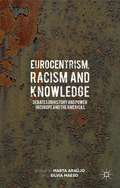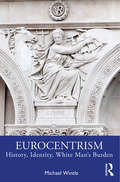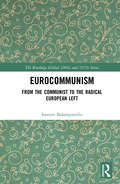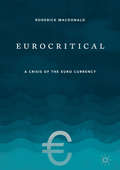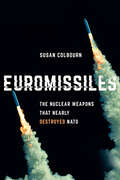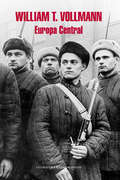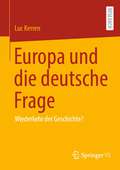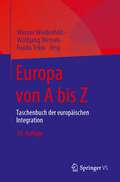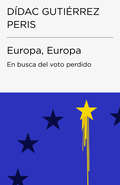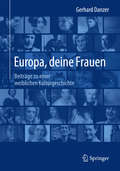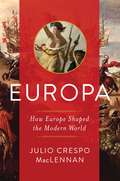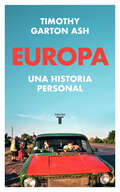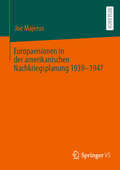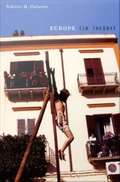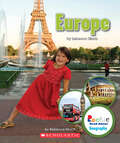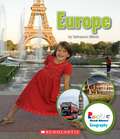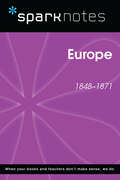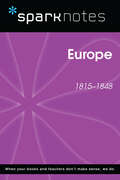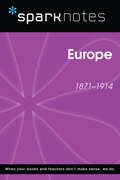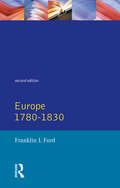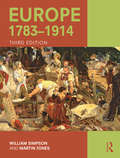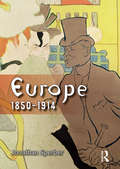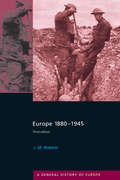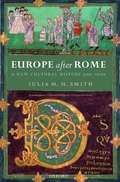- Table View
- List View
Eurocentrism, Racism and Knowledge: Debates on History and Power in Europe and the Americas
by Marta Araújo Silvia Rodríguez MaesoThis collection addresses key issues in the critique of Eurocentrism and racism regarding debates on the production of knowledge, historical narratives and memories in Europe and the Americas. Contributors explore the history of liberation politics as well as academic and political reaction through formulas of accommodation that re-centre the West.
Eurocentrism: History, Identity, White Man’s Burden
by Michael WintleThis book raises awareness of Eurocentrism’s enormous impact and shows how, over the course of five centuries, Eurocentrism has extended its power across the globe. In the twenty-first century, Eurocentrism’s hegemony remains powerful. By exploring a wide range of sources including Eurocentric maps and images, historiography, and Rudyard Kipling’s White Man’s Burden, Wintle uncovers Eurocentrism’s gradual evolution and reveals the ways in which it functions at both seen and unseen levels. Taking a thematic and then empirical approach, Eurocentrism offers a detailed and comprehensive discussion of Eurocentrism’s problems and dangers, pays special attention to the work of Samir Amin and James Blaut and applies notions garnered in the book to discuss Eurocentrism within the context of the twenty-first-century European Union. This study questions Eurocentrism’s function, its history, and its importance, providing a fresh insight into one of the world’s most complex and powerful cultural phenomena. With its multi- and interdisciplinary analysis, this book is an indispensable tool for both scholars and students concerned with modern history, politics, visual culture and political geography.
Eurocommunism: From the Communist to the Radical European Left (The Routledge Global 1960s and 1970s Series)
by Ioannis BalampanidisEurocommunism constitutes a "moment" of great transformation connecting the past and the present of the European Left, a political project by means of which left-wing politics in Europe effected a definitive transition to a thoroughly different paradigm. It rose in the wake of 1968 – that pivotal year of social revolt and rethinking that caused a divide between radical, progressive and socialist thinking in western and southern Europe and the Soviet model. Communist parties in Italy, France, Spain and Greece changed tack, drew on the dynamics of social radicalism of the time and came to be associated with political moderation, liberal democracy and negotiation rather than contentious politics forging a movement that would hold influence until the early 1980s. Eurocommunism thus wove an original political synthesis delineated against both the revolutionary Left and the social democracy: "party of struggle and party of governance".
Eurocritical
by Roderick MacdonaldThis book critically analyses the crisis of the euro currency from 2008 to the present. It argues that an understanding of this crisis requires an understanding of financial and economic crises in individual countries participating in the euro. It goes on to describe and explain the crises in four countries – Greece, Ireland, Spain and Italy – showing how they differ and together challenge the euro currency by requiring a varied policy response from Europe. Eurocritical is a guide for scholars, students and practitioners of finance and economics.
Euromissiles: The Nuclear Weapons That Nearly Destroyed NATO
by Susan ColbournIn Euromissiles, Susan Colbourn tells the story of the height of nuclear crisis and the remarkable waning of the fear that gripped the globe. In the Cold War conflict that pitted nuclear superpowers against one another, Europe was the principal battleground. Washington and Moscow had troops on the ground and missiles in the fields of their respective allies, the NATO nations and the states of the Warsaw Pact. Euromissiles—intermediate-range nuclear weapons to be used exclusively in the regional theater of war—highlighted how the peoples of Europe were dangerously placed between hammer and anvil. That made European leaders uncomfortable and pushed fearful masses into the streets demanding peace in their time. At the center of the story is NATO. Colbourn highlights the weakness of the alliance seen by many as the most effective bulwark against Soviet aggression. Divided among themselves and uncertain about the depth of US support, the member states were riven by the missile issue. This strategic crisis was, as much as any summit meeting between US president Ronald Reagan and Soviet general secretary Mikhail Gorbachev, the hinge on which the Cold War turned. Euromissiles is a history of diplomacy and alliances, social movements and strategy, nuclear weapons and nagging fears, and politics. To tell that history, Colbourn takes a long view of the strategic crisis—from the emerging dilemmas of allied defense in the early 1950s through the aftermath of the INF Treaty thirty-five years later. The result is a dramatic and sweeping tale that changes the way we think about the Cold War and its culmination.
Europa central
by William T. VollmannLa obra maestra de uno de los escritores más importantes de la narrativa contemporánea norteamericana, cuya obra ha sido premiada con el prestigioso National Book Award. El compositor Dimitri Shostakóvich, el director de documentales Roman Karmen, el artista Käthe Kollwitz, el general ruso Andrei Vlaslov e incluso Adolf Hitler... todos estos personajes -la mayoría reales, otros fruto de la ficción- son los protagonistas de esta fascinante novela histórica ambientada en la segunda guerra mundial. Europa Central examina el comportamiento -a modo de estudio del género humano- de un amplio número de personajes: generales, mártires, oficiales y poetas, traidores, artistas y músicos. Cada uno de sus actos, cada decisión tomada en un momento histórico de gran trascendencia, lleva al lector a descubrir las marañas de los estados totalitarios y dictatoriales, plagados de crímenes. La crítica ha dicho...«Europa Central es la última novela de un escritor cuya prosa destaca por encima de la de sus contemporáneos.»The Washington Post «En Europa Central, William T. Vollmann orquesta los impulsos del pasado como en un enorme y emocionante Opus 15 u Opus 21.»Tom LeClair, The New York Times Book Review «William T. Vollmann ha creado una novela que aspira al nivel superior en literatura.»Los Angeles Times «Europa Central es una novela que probablemente se convertirá en una de las obras maestras del siglo.»Chicago Tribune
Europa und die deutsche Frage: Wiederkehr der Geschichte?
by Luc KerrenMit der Wiedervereinigung schien die deutsche Frage, welche bis 1990 über Jahrhunderte das europäische Mächtegleichgewicht bestimmt hatte, eine endgültige Antwort erhalten zu haben, da das Land in der Mitte des Kontinents erstmals in seiner Geschichte „von Freunden umzingelt“ war. Spätestens mit dem Aufkommen der Eurokrise verdeutlichte sich jedoch, dass die Größe und Stärke des vereinten Deutschlands innerhalb Europas weiterhin als ambivalent wahrgenommen wurde: Einerseits kam es nicht umher, als „unverzichtbare Nation“ die Initiative zu übernehmen, gleichzeitig wurde es aber verdächtigt, hegemoniale Ambitionen an den Tag zu legen. Luc Kerren zeigt in diesem Buch, dass dieses Muster in der Folge ebenfalls während der Migrationskrise 2015/16 sowie im Verhältnis zu Russland zu beobachten war. Somit ist auch die Berliner Republik mit der Herausforderung konfrontiert, innerhalb Europas die Balance zu wahren: Zwischen einer „rücksichtslosen Führung“ und einer „führungslosen Rücksicht“.
Europa von A bis Z: Taschenbuch der europäischen Integration
by Wolfgang Wessels Werner Weidenfeld Funda TekinDieses Taschenbuch bietet Europa zum Nachschlagen: In über 100 Sachbeiträgen erklären renommierte EuropaexpertInnen wissenschaftlich fundiert und zugleich verständlich alle wichtigen Themen und Begriffe aus Politik, Wirtschaft und Geschichte der europäischen Einigung. Es erscheint in aktualisierter und erweiterter Fassung schon in der 16. Auflage und richtet sich an alle Europa-Interessierten, die sich gezielt und zuverlässig über den neuesten Stand in europapolitischen Fragen informieren wollen.Das Taschenbuch „Europa von A bis Z“ wird freundlicherweise vom Auswärtigen Amt gefördert. Das Institut für Europäische Politik (IEP) wird im Rahmen des Citizens, Equality, Rights and Values Programms 2021–2027 der Europäischen Union gefördert. Für die Inhalte zeichnet allein das IEP verantwortlich.
Europa, Europa: En busca del voto perdido (Colección Endebate #Volumen)
by Dídac Gutiérrez-PerisLa mejor explicación de los nuevos poderes del parlamento europeo y la importancia de las elecciones. ¿Son las elecciones europeas una pérdida de tiempo y la UE una máquina no democrática? Esa es una idea bastante extendida, pero este ameno resumen de los intentos por democratizar las instituciones europeas y su culminación en la última reforma que concede grandes poderes al Parlamento Europeo la desmiente. Son las segundas elecciones con mayor participación del mundo, tras la India y por delante de Estados Unidos, y eligen un Parlamento con capacidad de intervenir en todos los asuntos relevantes de los países miembros.
Europa, deine Frauen
by Gerhard DanzerFrauen sind in den letzten Jahrhunderten - ganz bevorzugt in den letzten Jahrzehnten - kulturgeschichtlich viel intensiver und origineller tätig gewesen, als dies gemeinhin wahrgenommen wird. Was genau die kulturhistorischen Dimensionen des ,,Frau-Seins" sind, wird vom Autor differenziert betrachtet und dargestellt. Die Kulturgeschichte würde ohne den Anteil, den diese Frauen daran hatten, ganz anders aussehen. Der weibliche Einfluss ist unverkennbar im Wachsen begriffen und sein Anteil an kulturgeschichtlicher Entwicklung darf nicht unterschätzt werden. Madame de Sévigné - Madame du Châtelet - Johanna Schopenhauer - Rahel Varnhagen - Louise Labé - Elisabeth Barrett-Browning - George Eliot - Marie von Ebner-Eschenbach - Gabriele Münter -Therese Giehse - Melina Mercouri - Pina Bausch - Ellen Key - Maria Montessori - Karen Horney - Astrid Lindgren - Bertha von Suttner - Beatrice Webb- Rosa Luxemburg - Franca Magniani - Margarete Susman - Hannah Arendt - Simone de Beauvoir - Agnes Heller
Europa: How Europe Shaped The Modern World (Marcial Pons Historia Ser.)
by Julio MacLennanAn original and innovative examination of the continent—and its culture—that was the epicenter of the world for almost five centuries. European history is deeply embedded in the global civilization that has emerged in the 21st century. More than two thirds of today’s nations were once European colonies or protectorates. Europe’s legacy is evident in the trajectory of the United States and has influenced aspiring hegemonic powers like China. For centuries, Europe was the heart and soul of the West, and European powers enjoyed unprecedented global hegemony, not only by military and economic means, but also through their influence on politics and culture. The rise and fall of the European era of world supremacy constitutes one of the most epic histories of all time. ere were the extraordinary changes of the Renaissance and its aftermath, which marked the beginning of Europe's imposition of itself over other civilizations, but it was Columbus’s “discovery” of America that provided the key to its meteoric rise. Spain and Portugal would form the first global empires, closely followed by Holland, Britain, France and Russia. Following the exploits of navigators like Vasco da Gama and Captain Cook, the conquistador Hernan Cortes, missionary Henry Livingstone and others, Europa reveals the origins of Europe’s rapid expansion, which was then expanded upon further by millions of Europeans migrants, who spread their culture and values. MacLennan also reveals how statesmen, scientists, inventors, philosophers, writers, and revolutionaries were responsible for transforming the continent into a civilization that inspired universal attraction. Even into the twentieth century, after reaching the nadir of imperial decline and self- destruction, Europe has once again become a global trendsetter.
Europa: Una historia personal
by Timothy Garton AshUna asombrosa mezcla de historia contemporánea, reportaje de investigación y memoria íntima de la pluma de uno de los escritores que mejor han escrito sobre Europa. «El libro que Europa necesitaba, en el momento justo. Perfecto para el presente». Timothy Snyder A partir de la experiencia de quienes lo vivieron, Europa cuenta cómo el continente se recuperó lentamente de la Segunda Guerra Mundial y logró reconstruirse y prosperar. Y luego se atascó. Timothy Garton Ash, uno de los mejores pensadores europeos, ha pasado su vida estudiando esta parte del mundo. Este emocionante libro está repleto de experiencias vividas: desde los recuerdos de su padre del desembarco de Normandía y el espionaje al que lo sometió la Stasi hasta entrevistas con guerrilleros albaneses en las montañas de Kosovo, o sus encuentros con adolescentes desesperados en los barrios más pobres de París, aparte de sus consejos a presidentes, ministros de exteriores y primeros ministros. Europa es al tiempo una historia atestiguada y tangible de un periodo de increíbles avances, una crónica honesta de las cosas que salieron mal y una llamada urgente a los ciudadanos de este gran y viejo continente para entender y defender lo que hemos logrado colectivamente. La crítica ha dicho:«Una conmovedora carta de amor a Europa. Europa conjuga las memorias, el análisis político y la crítica social para iluminar el futuro de un continente aún perseguido por su pasado».Lea Ypi «Sabemos que hay alemanes, italianos, españoles y polacos, ¿pero existen los europeos? Pues sí, al menos uno: Timothy Garton Ash.Europa es la brillante y cautivadora historia de cómo se convirtió en uno de ellos».Mark Lilla«Este libro, escrito por un hombre que asistió en primera fila a gran parte de la historia que describe, se basa en sus experiencias y en las de sus amigos para dar vida a los acontecimientos».M. E. Sarotte «GartonAsh combina hábilmente la erudición, la experiencia periodística y las observaciones e historias personales en Europa. Un delicioso libro que invita a la reflexión».Robert B. Zoellick «Garton Ash se ha labrado un nicho único como historiador del presente. Europa combina su testimonio de la evolución de Europa con su aguda visión histórica para ofrecer un libro innovador y absorbente».Charles A. Kupchan«Timothy Garton Ash cuenta la historia épica de la Europa de la posguerra».Irish Times «¿Es Europa una entidad real o una mera construcción del deseo? Este libro, observado de cerca, explora ambas posibilidades».Kirkus Reviews
Europavisionen in der amerikanischen Nachkriegsplanung 1939-1947
by Joe MajerusWährend des Zweiten Weltkrieges wurden in den Vereinigten Staaten von Amerika bereits verschiedene Visionen zur Zukunft und Nachkriegsordnung Europas ausgearbeitet, die als solche den ideellen Grundstein für spätere außenpolitische Vorhaben legten und folglich einen nicht unwesentlichen Einfluss auf die anschließende Umsetzung selbiger zeitigten. Jene Vorstellungen zeichneten sich zum einen dadurch aus, dass viele der erwarteten Probleme bei der Etablierung eines neuen zwischenstaatlichen Systems häufig von der Warte gesamtstrategischer Überlegungen und Erfordernisse betrachtet wurden, im Zuge derer nationale Eigeninteressen mit liberal-amerikanischen Idealbildern verbunden und im Rahmen der übergreifenden Vision eines globalen Internationalismus unter der Führung der USA durchgesetzt werden sollten. Zum anderen beschränkten sich amerikanische Europakonzeptionen keineswegs nur auf einzelne Teilaspekte politischer oder wirtschaftlicher Natur, sondern versuchten vielmehr ganzheitliche Lösungen zu liefern, indem sie die vielfältigen Herausforderungen, denen sich Europa nach dem Krieg gegenübersehen würde, systematisch in Bezug zueinander setzten. Anhand eines prosopographischen Ansatzes wird untersucht, inwiefern die Errichtung einer stabilen Friedens- und Sicherheitsordnung in Europa nicht erst mit Beginn des Kalten Krieges zu einem zentralen Eckpfeiler der amerikanischen Außenpolitik geworden war.
Europe (In Theory)
by Roberto M. DainottoEurope (in Theory) is an innovative analysis of eighteenth- and nineteenth-century ideas about Europe that continue to inform thinking about culture, politics, and identity today. Drawing on insights from subaltern and postcolonial studies, Roberto M. Dainotto deconstructs imperialism not from the so-called periphery but from within Europe itself. He proposes a genealogy of Eurocentrism that accounts for the way modern theories of Europe have marginalized the continent's own southern region, portraying countries including Greece, Italy, Spain, and Portugal as irrational, corrupt, and clan-based in comparison to the rational, civic-minded nations of northern Europe. Dainotto argues that beginning with Montesquieu's The Spirit of Laws (1748), Europe not only defined itself against an "Oriental" other but also against elements within its own borders: its South. He locates the roots of Eurocentrism in this disavowal; internalizing the other made it possible to understand and explain Europe without reference to anything beyond its boundaries. Dainotto synthesizes a vast array of literary, philosophical, and historical works by authors from different parts of Europe. He scrutinizes theories that came to dominate thinking about the continent, including Montesquieu's invention of Europe's north-south divide, Hegel's "two Europes," and Madame de Stal's idea of opposing European literatures: a modern one from the North, and a pre-modern one from the South. At the same time, Dainotto brings to light counter-narratives written from Europe's margins, such as the Spanish Jesuit Juan Andrs's suggestion that the origins of modern European culture were eastern rather than northern and the Italian Orientalist Michele Amari's assertion that the South was the cradle of a social democracy brought to Europe via Islam.
Europe (Rookie Read-About Geography: Continents)
by Rebecca HirschAn introduction to the geography and people of Europe.Rookie Read-About: Continents series gives the youngest reader (Ages 3-6) an introduction to the components that make each continent distinctive and exceptional. Readers will get to know each continents' geography, history, and wildfire.
Europe (Rookie read-about geography)
by Rebecca HirschRookie Read-About: Continents series gives the youngest reader (Ages 3-6) an introduction to the components that make each continent distinctive and exceptional. Readers will get to know each continents' geography, history, and wildlife.
Europe (SparkNotes History Notes)
by SparkNotesEurope (1848-1871) (SparkNotes History Note) Making the reading experience fun! SparkNotes History Guides help students strengthen their grasp of history by focusing on individual eras or episodes in U.S. or world history. Breaking history up into digestible lessons, the History Guides make it easier for students to see how events, figures, movements, and trends interrelate. SparkNotes History Guides are perfect for high school and college history classes, for students studying for History AP Test or SAT Subject Tests, and simply as general reference tools.Each note contains a general overview of historical context, a concise summary of events, lists of key people and terms, in-depth summary and analysis with timelines, study questions and suggested essay topics, and a 50-question review quiz.
Europe (SparkNotes History Notes)
by SparkNotesEurope (1815-1848) (SparkNotes History Note) Making the reading experience fun! SparkNotes History Guides help students strengthen their grasp of history by focusing on individual eras or episodes in U.S. or world history. Breaking history up into digestible lessons, the History Guides make it easier for students to see how events, figures, movements, and trends interrelate. SparkNotes History Guides are perfect for high school and college history classes, for students studying for History AP Test or SAT Subject Tests, and simply as general reference tools.Each note contains a general overview of historical context, a concise summary of events, lists of key people and terms, in-depth summary and analysis with timelines, study questions and suggested essay topics, and a 50-question review quiz.
Europe (SparkNotes History Notes)
by SparkNotesEurope (1871-1914) (SparkNotes History Note) Making the reading experience fun! SparkNotes History Guides help students strengthen their grasp of history by focusing on individual eras or episodes in U.S. or world history. Breaking history up into digestible lessons, the History Guides make it easier for students to see how events, figures, movements, and trends interrelate. SparkNotes History Guides are perfect for high school and college history classes, for students studying for History AP Test or SAT Subject Tests, and simply as general reference tools.Each note contains a general overview of historical context, a concise summary of events, lists of key people and terms, in-depth summary and analysis with timelines, study questions and suggested essay topics, and a 50-question review quiz.
Europe 1600-1789: A volume of the Arnold History of Europe
by Anthony F. UptonFrom the Book: "The Arnold History of Europe-- This new series explores European history, from the last years of the Roman Empire to the end of the twentieth century. Each volume tackles a broad sweep of history, not invariably sticking to conventional periodizations, and asks bold questions of its material. The series aims to make sense of periods and eras, across countries and cultures, but without trying to homogenize everything."
Europe 1780 - 1830 (General History of Europe)
by Franklin L. FordEurope 1780--1830 rapidly established itself as a standard introduction to European history in the age of the French Revolution and its aftermath when it first appeared. Now for the first time the book has been fully revised, updated and expanded. The half-century covered constitutes one of the most complex, eventful and rapidly changing of any in Europe's history. It is a period whose emphasis on conflict and political crisis combines daring innovation with the stubborn persistence of many older attitudes and patterns of human behaviour. Professor Ford explores these tensions throughout; and he gives his readers a powerful sense of the extraordinary energy, in every aspect of human activity, that characterised the time.
Europe 1783-1914
by William Simpson Martin JonesThe third edition of Europe 1783-1914 provides a comprehensive overview of Europe from the outbreak of the French Revolution to the origins of the First World War. William Simpson and Martin Jones combine accounts of the most important countries, notably France, Germany and Russia, with the wider political, economic, social and cultural developments affecting Europe as a whole. These include: A survey of Europe c.1780: the social and economic background, forms of government, and the Enlightenment The impact of the French Revolution and Napoleon on Europe The spread of nationalism: the 1848 Revolutions and the unification of Italy and Germany Changes in the world of ideas: religious belief, romanticism, and cultural achievements in art, literature and music The age of imperialism: the expansion of Europe, Marxism and left-wing movements, international relations, 1870-1914 The reciprocal relationship between Europe and the United States Europe in 1914: shifts in the intellectual climate through the works of Darwin and Freud, scientific discoveries and the impact of new technologies, and changes in society and the position of women. Each chapter features a list of key dates, concise background information and suggestions for further reading, as well as a concluding ‘Topics for Debate’ section which contains relevant contemporary sources and outlines the contrasting views of recent historians on the key issues. The suggestions for further reading have been updated in every chapter by the addition of relevant and significant new books, published up to and including 2014. Extensively illustrated throughout with maps, contemporary cartoons and portraits, Europe 1783–1914 is a clear, detailed and highly accessible analysis of this turbulent and formative period of European history.
Europe 1850-1914: Progress, Participation and Apprehension
by Jonathan SperberThis innovative survey of European history from the middle of the nineteenth century to the outbreak of the First World War tells the story of an era of outward tranquillity that was also a period of economic growth, social transformation, political contention and scientific, and artistic innovation. During these years, the foundations of our present urban-industrial society were laid, the five Great Powers vied in peaceful and violent fashion for dominance in Europe and throughout the world, and the darker forces that were to dominate the twentieth century – violent nationalism, totalitarianism, racism, ethnic cleansing – began to make themselves felt. Jonathan Sperber sets out developments in this period across the entire European continent, from the Atlantic to the Urals, from the Baltic to the Mediterranean. To help students of European history grasp the main dynamics of the period, he divides the book into three overlapping sections covering the periods from 1850-75, 1871-95 and 1890-1914. In each period he identifies developments and tendencies that were common in varying degrees to the whole of Europe, while also pointing the unique qualities of specific regions and individual countries. Throughout, his argument is supported by illustrative material: tables, charts, case studies and other explanatory features, and there is a detailed bibliography to help students to explore further in those areas that interest them.
Europe 1880-1945 (General History of Europe)
by J.M. RobertsSuitable for 19th and 20th century Europe/modern Europe undergraduate courses.This well-established and immensely successful book provides a standard introduction to the subject by one of Britain's most popular historians. Social, economic and social history are skillfully integrated within a framework of political narrative history.
Europe After Rome: A New Cultural History, 500-1000
by Julia M. H. SmithThis is the first single-author study in over fifty years to offer an integrated appraisal of the early Middle Ages as a dynamic and formative period in European history. Written in an attractive and accessible style, it makes extensive use of original sources to introduce early medieval menand women at all levels of society from slave to emperor, and allows them to speak to the reader in their own words. It overturns traditional narratives and instead offers an entirely fresh approach to the centuries from c. 500 to c. 1000. Rejecting any notion of a dominant, uniform early medievalculture, it argues that the fundamental characteristic of the early middle ages is diversity of experience. To explain how the men and women who lived in this period ordered their world in cultural, social, and political terms, it employs an innovative methodology combining cultural history,regional studies, and gender history. Ranging comparatively from Ireland to Hungary and from Scotland and Scandinavia to Spain and Italy, the analysis highlights three themes: regional variation, power, and the legacy of Rome. The book's eight chapters examine the following subjects: Speaking and Writing; Living and Dying; Friends and Relations; Men and Women; Labour and Lordship; Getting and Giving; Kingship and Christianity; Rome and the Peoples of Europe. Collectively, they establish the complex cultural realitieswhich distinguished Europe in the period between the end of the central institutions of the western Roman empire in the fifth century and the emergence of a Rome-centred papal monarchy from the late eleventh century onwards. In the context of debates about the social, religious and cultural meaningof 'Europe' in the early twenty-first century, this books seeks the origins of European cultural pluralism and diversity in the early Middle Ages.
